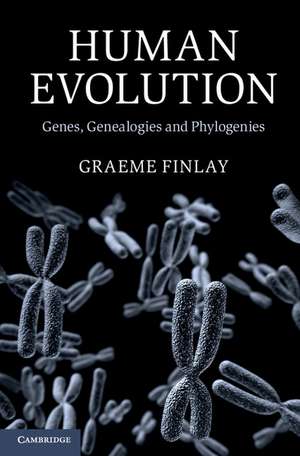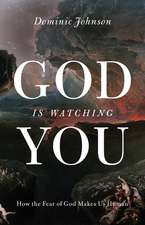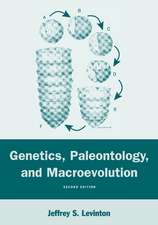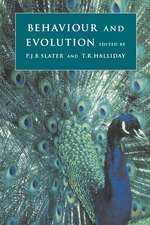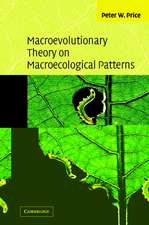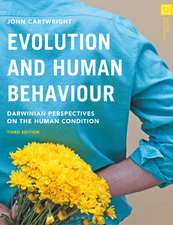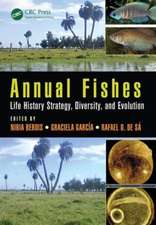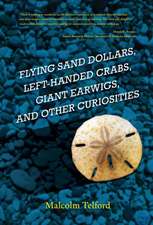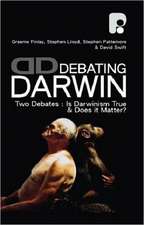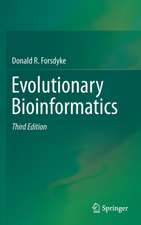Human Evolution: Genes, Genealogies and Phylogenies
Autor Graeme Finlayen Limba Engleză Hardback – 11 sep 2013
| Toate formatele și edițiile | Preț | Express |
|---|---|---|
| Paperback (1) | 352.30 lei 6-8 săpt. | |
| Cambridge University Press – 11 aug 2021 | 352.30 lei 6-8 săpt. | |
| Hardback (1) | 508.66 lei 3-5 săpt. | |
| Cambridge University Press – 11 sep 2013 | 508.66 lei 3-5 săpt. |
Preț: 508.66 lei
Preț vechi: 571.53 lei
-11% Nou
Puncte Express: 763
Preț estimativ în valută:
97.33€ • 100.41$ • 81.22£
97.33€ • 100.41$ • 81.22£
Carte disponibilă
Livrare economică 06-20 martie
Preluare comenzi: 021 569.72.76
Specificații
ISBN-13: 9781107040120
ISBN-10: 1107040124
Pagini: 368
Ilustrații: 101 b/w illus. 11 tables
Dimensiuni: 157 x 235 x 24 mm
Greutate: 0.64 kg
Ediția:New.
Editura: Cambridge University Press
Colecția Cambridge University Press
Locul publicării:New York, United States
ISBN-10: 1107040124
Pagini: 368
Ilustrații: 101 b/w illus. 11 tables
Dimensiuni: 157 x 235 x 24 mm
Greutate: 0.64 kg
Ediția:New.
Editura: Cambridge University Press
Colecția Cambridge University Press
Locul publicării:New York, United States
Cuprins
Preface; Prologue; 1. Retroviral genealogy; 2. Jumping genealogy; 3. Pseudogenealogy; 4. The origins of new genes; Epilogue: what really makes us human; References; Index.
Recenzii
'In this book Dr Finlay takes several examples to illustrate our evolutionary tree at the molecular and genomic level. Step by step he provides a wealth of cumulative evidence that demonstrates how our genomes are related to other primates and to our more distant biological relatives. The evidence is compelling and shows the elegant ways in which we are connected to the rest of biology. Nonetheless we are more than just intelligent apes, and Finlay is careful to emphasise that our genomes are only part of the story of what it means to be human and that we have also been shaped by historical, cultural and religious factors that may not affect our physiology and anatomy but define us a human beings.' Keith R. Fox, University of Southampton
'Graeme Finlay has written a remarkable book outlining some of the most powerful evidence for human evolution - our own genes. Many people today have heard scientists say that evolution is a fact and that the evidence for evolution is overwhelming. Finlay demonstrates without any doubt whatsoever why this is the case. He has a wide grasp of the primary scientific literature and offers general readers an accessible introduction to the complexities of modern genetics. He deals with the fundamental topics of retroviruses, jumping genes, pseudogenes, and the origin of new genes during evolution … [He] is fully aware of the challenges that human evolution presents to religious people. With sensitivity, he encourages them not to fear the evolutionary evidence, but to embrace it [in] all its splendor and wondrous glory. For me, reading Finlay's book was a spiritual experience. I highly recommend [it].' Denis O. Lamoureux, University of Alberta
'Graeme Finlay's Human Evolution provides rigorous and definitive proof of evolution. With countless examples from genetics - many quite fascinating - he shows that common ancestry is indeed a fact. All life forms, including humans, evolved from earlier species. Finlay concludes, however, that 'genetics is not the whole story', finding ample room for traditional concepts of human personhood. Human Evolution is well worth a careful reading.' Karl W. Giberson, Stonehill College, USA
'Graeme Finlay succeeds marvellously at that most difficult of challenges in scientific writing: to captivate and animate the reader without blurring detail - and the details are fascinating. From viral insertions, to jumping genes and 'fossil' DNA, the new ability to read the human genome, including his perspective as a cancer specialist and committed Christian, is Finlay's gift to us. I came away from the book with a new respect for our connection to animal cousins on the tree of life, yet a renewed appreciation of the special privilege and responsibility of being human.' Tom McLeish, University of York, UK
'Graeme Finlay has written a remarkable book outlining some of the most powerful evidence for human evolution - our own genes. Many people today have heard scientists say that evolution is a fact and that the evidence for evolution is overwhelming. Finlay demonstrates without any doubt whatsoever why this is the case. He has a wide grasp of the primary scientific literature and offers general readers an accessible introduction to the complexities of modern genetics. He deals with the fundamental topics of retroviruses, jumping genes, pseudogenes, and the origin of new genes during evolution … [He] is fully aware of the challenges that human evolution presents to religious people. With sensitivity, he encourages them not to fear the evolutionary evidence, but to embrace it [in] all its splendor and wondrous glory. For me, reading Finlay's book was a spiritual experience. I highly recommend [it].' Denis O. Lamoureux, University of Alberta
'Graeme Finlay's Human Evolution provides rigorous and definitive proof of evolution. With countless examples from genetics - many quite fascinating - he shows that common ancestry is indeed a fact. All life forms, including humans, evolved from earlier species. Finlay concludes, however, that 'genetics is not the whole story', finding ample room for traditional concepts of human personhood. Human Evolution is well worth a careful reading.' Karl W. Giberson, Stonehill College, USA
'Graeme Finlay succeeds marvellously at that most difficult of challenges in scientific writing: to captivate and animate the reader without blurring detail - and the details are fascinating. From viral insertions, to jumping genes and 'fossil' DNA, the new ability to read the human genome, including his perspective as a cancer specialist and committed Christian, is Finlay's gift to us. I came away from the book with a new respect for our connection to animal cousins on the tree of life, yet a renewed appreciation of the special privilege and responsibility of being human.' Tom McLeish, University of York, UK
Notă biografică
Descriere
Brings together new research demonstrating how evidence based on genetic phenomena should end any lingering controversy over human evolution.
